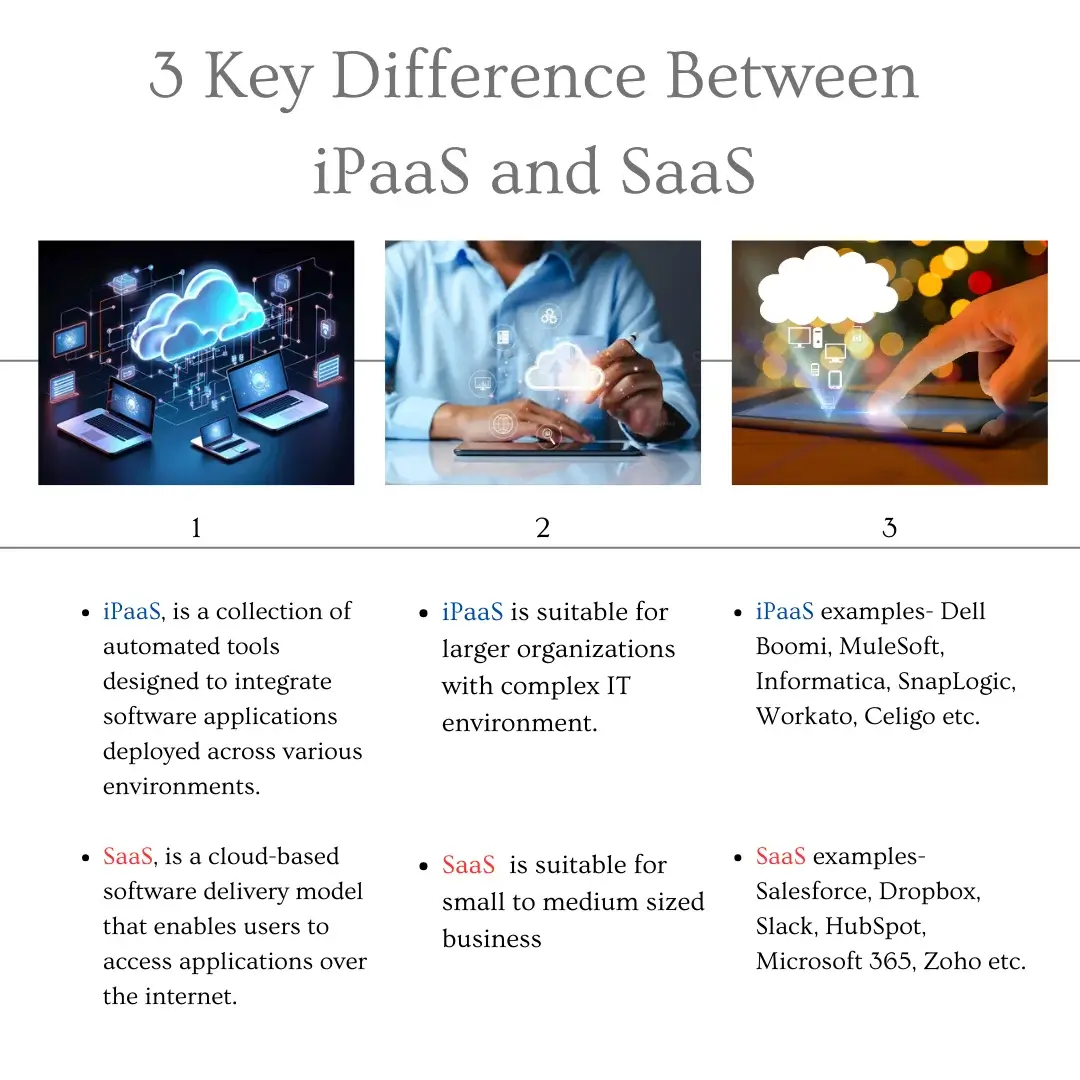In today’s fast-paced business landscape, staying at the forefront of technological advancements is crucial for organizations aiming to maintain their competitive edge. Among the recent transformative trends, Integration Platform as a Service (iPaaS) stands out as a game-changer. By harnessing the power of cloud integration, iPaaS has reshaped the way businesses handle their data and applications, enabling seamless connectivity and fostering collaboration across various domains and industries.
Organizations wishing to preserve their competitive advantage must keep ahead of the curve in the rapidly changing worlds of business and technology. iPaaS, or Integration Platform as a Service, has become one of the most important trends in recent years. Through the integration of the cloud, iPaaS has revolutionized how businesses manage their data and apps. This allows for seamless connectivity and collaboration.
iPaaS in Focus: iPaaS Definition
iPaaS stands for Integration Platform as a Service, comprises a collection of cloud-based services that facilitate the creation, execution, and management of integration workflows. These workflows establish connections between various processes, services, applications, and data, whether they reside on-premises or in the cloud, and can span individual organizations or bridge multiple entities.
Let’s develop a clear idea of what iPaaS is before delving into the trends. It simplifies the information transfer between several software programs, allowing companies to function more effectively and efficiently.
Integration Platform as a Service (iPaaS) is like a digital bridge that operates in the cloud. Its primary purpose is to seamlessly connect and facilitate communication between various software programs, systems, and data sources that a business uses. Think of it as a translator that ensures different pieces of software can understand and work with each other effectively.
Some of iPaaS Platform example- Dell Boomi, MuleSoft, Informatica, SnapLogic, Workato, Celigo etc.
Here’s a Simplified Breakdown
Cloud-Based: iPaaS resides in the cloud, which means it’s accessible from anywhere with an internet connection. This eliminates the need for physical infrastructure.
Integration Facilitator: iPaaS acts as a facilitator, making it easier for different software applications to talk to each other. It smoothens the flow of information between them.
Streamlined Operations: By ensuring that software components can share data and work together seamlessly, iPaaS helps companies operate more efficiently. It reduces manual data entry, minimizes errors, and enhances productivity.
Efficiency Booster: iPaaS enables businesses to automate processes that previously required manual intervention. This automation can save time and resources while improving accuracy.
Improved Decision-Making: When data from various sources can be easily combined and analyzed, it empowers organizations to make informed decisions based on a more comprehensive view of their operations.
iPaaS vs. SaaS: Making the Difference Clear
SaaS (Software as a Service) and iPaaS are both cloud-based technologies, although they have different uses. SaaS focuses on providing software programs online so that customers can access and utilize them without installing anything. On the other side, iPaaS focuses on connecting various applications so they may effortlessly communicate and share data.

iPaaS Trends: Redefining the Commercial Environment
Let’s now investigate the iPaaS trends that are reshaping the commercial landscape:
1. Integration of a hybrid cloud
iPaaS is essential for integrating these many systems as more businesses choose hybrid cloud environments, which include on-premises and cloud-based solutions.
2. Integration of IoT
The Internet of Things (IoT) has gained a lot of popularity, and iPaaS is essential in integrating IoT gadgets and sensors with current corporate applications, enabling in-the-moment data analysis and useful insights.
3. Integration of AI and ML
iPaaS platforms are embracing AI and ML, enabling companies to incorporate sophisticated analytics and predictive models into their operations.
4. Microservices Architecture
iPaaS works well with microservices architecture, allowing organizations to create and combine compact, independently deployable services for more adaptability and scalability.
5. Integration of self-service
Business users can now easily develop connectors on modern iPaaS systems without the need for intensive IT intervention.
6. Ecosystem interaction
iPaaS is extending beyond conventional application-to-application interaction to encompass partner ecosystems, facilitating frictionless cooperation and data sharing with external stakeholders.
iPaaS Capabilities
The capabilities of iPaaS are extensive and significant. The following are some of the main functionalities that iPaaS platforms provide:
1. Data Integration: Whether they are on-premises or in the cloud, different data sources can be connected by organizations using iPaaS. This guarantees a comprehensive picture of the data and encourages wise decision-making.
2. Application Integration: iPaaS enables the seamless collaboration of various software applications, facilitating cross-functional operations and decreasing operational silos.
3. Real-Time Connection: Businesses may accomplish real-time data synchronization and communication with iPaaS, which improves customer experiences and speeds up response times.
4. Automated Workflows: iPaaS systems make it possible to build automated workflows, which cut down on manual effort and boost productivity.
5. Security and Compliance: iPaaS systems frequently include strong security features and compliance controls, ensuring that data is kept secure and compliant with legal standards.
Your Trusted Partner in Integration Success: iPaaS Consultant
Organizations are increasingly looking to iPaaS experts for advice as iPaaS usage develops. These professionals support the choice of the best iPaaS platform, the creation of integration strategies, and the smooth implementation.
When it comes to iPaaS integration, the key advantage of involving experienced consultants can be summarized in one word: speed. If you’ve chosen to use any iPaaS solution, while your internal team can certainly receive training and configure the system, time is often of the essence. This is where iPaaS consultants can make a significant difference by accelerating the integration process and delivering quick wins.
At OdiTek, we adopt an agile, fast-paced, and results-driven approach to iPaaS integrations. We understand that the true benefits of iPaaS solutions lie in how they impact your business processes. Therefore, the sooner your iPaaS system is integrated, the quicker you can start reaping these benefits.
Every organization aspires to enhance business velocity, streamline operations, and embark on a journey of digital transformation. When you engage iPaaS consultants, you gain the advantage of speed and precision. There’s no need to guess how to build the tool – our consultants craft expertly designed, robust integrations that align seamlessly with your business objectives.
Conclusion
iPaaS has become a revolutionary force in the quick-moving world of business technology, fostering productivity, teamwork, and creativity. Organizational operations are altering as a result of the emerging iPaaS trends mentioned in this article, which help them to remain adaptable and competitive in a market that is changing quickly. The potential for development and success is limitless as long as organizations continue to recognize the value of iPaaS.
at OdiTek, we understand the dynamic landscape of iPaaS trends and the transformative impact they have on businesses. As organizations adapt to the emerging iPaaS trends outlined in this article, they gain the agility and competitiveness needed to thrive in a rapidly changing market.
Our iPaaS services are designed to empower organizations, helping them harness the full potential of these trends. We believe that the possibilities for growth and success are boundless as long as businesses continue to recognize and leverage the value of iPaaS. At OdiTek, we are committed to being your partner on this journey, guiding you toward a future of innovation and resilience.







